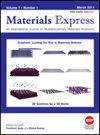MnO2 nanoparticle improves the immunosuppressive characteristics of tumor-associated mesenchymal stromal cells
IF 0.7
4区 材料科学
Q3 Materials Science
引用次数: 0
Abstract
Tumor-associated marrow mesenchymal stem/stromal cells have immunosuppressive effects on immune cells within the tumor microenvironment in various cancers. However, effective treatments targeting these cells are currently limited. Here, we developed a nanoparticle of MnO2 aiming to inhibit the immunosuppressive properties of Tumor-Associated Marrow Mesenchymal stem/stromal cells. We investigated the physicochemical characteristics of MnO2 and its potential for alleviating hypoxia in IL17 and IFNγ transformed Tumor-Associated Marrow Mesenchymal stem/stromal cells. The Tumor-Associated Marrow Mesenchymal stem/stromal cells had higher expression level of chemokines and immunosuppressors, which promotes the progression of tumors and inhibits the immune cells, leading to tumor metastasis and angiogenesis. After treatment of the nanoparticle of MnO2, the expression level of chemokines had significantly decreased due to the unique properties of MnO2. Furthermore, the nanoparticle decreased the expression level of immunosuppressors of Tumor-Associated Marrow Mesenchymal stem/stromal cells and rescued the proliferation of T lymphocytes cocultured with the cells. In conclusion, our findings demonstrate that MnO2 nanoparticles effectively improve the hypoxic microenvironment and alleviate immunosuppression caused by Tumor-Associated Marrow Mesenchymal stem/stromal cells. The utilization of this novel approach exhibits promising potential as a therapeutic strategy for addressing diverse types of cancers.MnO2 纳米粒子改善了肿瘤相关间充质基质细胞的免疫抑制特性
在各种癌症中,与肿瘤相关的骨髓间充质干细胞/基质细胞对肿瘤微环境中的免疫细胞具有免疫抑制作用。然而,目前针对这些细胞的有效治疗方法还很有限。在此,我们开发了一种 MnO2 纳米粒子,旨在抑制肿瘤相关骨髓间充质干/基质细胞的免疫抑制特性。我们研究了二氧化锰的理化特性及其缓解 IL17 和 IFNγ 转化的肿瘤相关骨髓间充质干/基质细胞缺氧的潜力。肿瘤相关骨髓间充质干/基质细胞具有较高的趋化因子和免疫抑制因子表达水平,这促进了肿瘤的进展并抑制了免疫细胞,导致肿瘤转移和血管生成。经过二氧化锰纳米粒子处理后,由于二氧化锰的独特性质,趋化因子的表达水平明显降低。此外,纳米颗粒还降低了肿瘤相关骨髓间充质干/基质细胞免疫抑制因子的表达水平,并挽救了与细胞共培养的 T 淋巴细胞的增殖。总之,我们的研究结果表明,MnO2 纳米粒子能有效改善缺氧微环境,减轻肿瘤相关骨髓间充质干/基质细胞引起的免疫抑制。利用这种新方法作为一种治疗策略来治疗各种类型的癌症具有广阔的前景。
本文章由计算机程序翻译,如有差异,请以英文原文为准。
求助全文
约1分钟内获得全文
求助全文
来源期刊

Materials Express
NANOSCIENCE & NANOTECHNOLOGY-MATERIALS SCIENCE, MULTIDISCIPLINARY
自引率
0.00%
发文量
69
审稿时长
>12 weeks
期刊介绍:
Information not localized
 求助内容:
求助内容: 应助结果提醒方式:
应助结果提醒方式:


